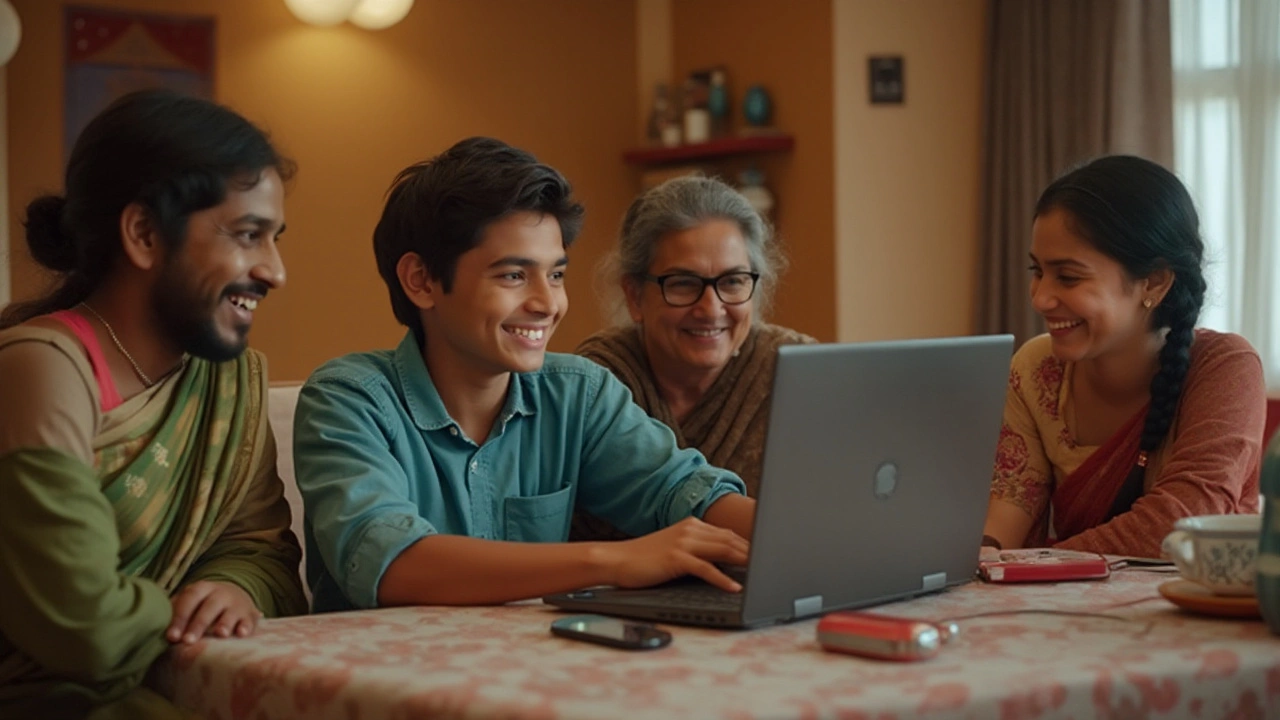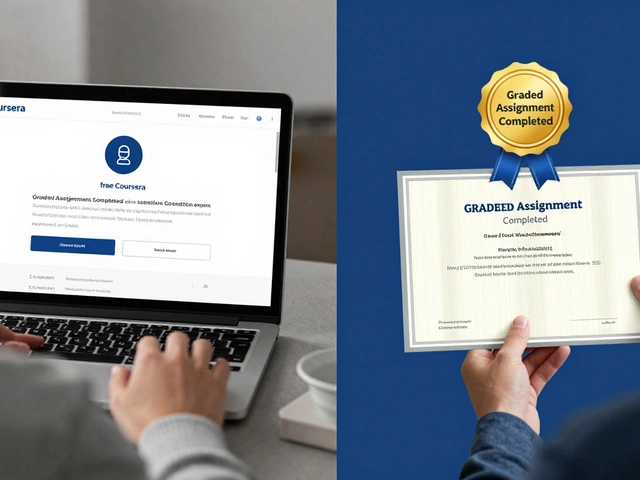In the bustling era where technology steers much of our daily lives, coding stands out as a vital skill to possess. As a beginner, stepping into the coding world can often seem like venturing into a dense forest without a map. However, the journey becomes significantly clearer when armed with the right knowledge and tools.
This guide aims to serve as that map, offering a straightforward path for those new to programming. We'll explore why learning to code is incredibly useful in today's job market, how to choose a language that aligns with your goals, and the fundamental concepts that form the backbone of all programming. With the emergence of endless resources designed for different learning styles, you’ll find the right ones to fit your needs. Let's navigate this exciting adventure together, setting you on a sure path to not just learn coding, but to understand and enjoy it.
- Why Learn Coding?
- Choosing Your First Programming Language
- Understanding Basic Concepts
- Finding the Right Learning Resources
- Tips for Effective Practice
- Embracing a Coding Community
Why Learn Coding?
Today, coding is more than just a technical skill; it is a passport to understanding and impacting the digital world. The ability to code opens up a vast array of opportunities, from enhancing one’s career prospects to empowering individuals to innovate and create. With industries such as healthcare, finance, and entertainment relying increasingly on technology, the demand for coders is at an all-time high. This need isn't just confined to technology companies; nearly every sector values the capabilities of someone who can write and understand computer programs. Whether you're interested in developing websites, apps, or even understanding the mechanics behind the latest smart gadgets, coding is fundamental. Coding for beginners offers a logical way to train your brain to approach complex problems methodically. It's about more than giving instructions to computers; it's about learning a language that helps solve real-world issues.
The democratization of technology means that virtually anyone can learn to code. People often point out that today's programmers are akin to the inventors and scientists of past generations, paving new paths for future developments. A quote from Steve Jobs encapsulates this sentiment perfectly:
"Everyone should learn how to program a computer because it teaches you how to think."This cognitive benefit is one key reason to dive into programming. Additionally, global surveys have demonstrated that individuals with coding skills often out-earn their peers, underscoring economic benefits. In a job market that is more competitive than ever, knowing how to learn to code can be your distinguishing factor.
Apart from professional advantages, coding also fosters creativity. Consider the vast amount of digital content consumed daily—from games and animations to interactive websites. Coders bring these to life, transforming abstract ideas into tangible experiences that engage millions worldwide. Take creative coding for instance; by learning programming basics, artists and designers can explore a whole new dimension of expression that traditional art forms don't allow. Moreover, coding encourages collaboration, be it through open-source projects or large-scale tech endeavors, connecting people and ideas from diverse backgrounds. Venturing into coding is much like acquiring a superpower which gives form to innovation while driving lasting, impactful change in society. The importance of coding skills will only increase as our world continues to evolve, making programming basics a valuable asset for any forward-thinking individual.
Choosing Your First Programming Language
When embarking on the journey to learn coding, one of the most crucial decisions you'll make is selecting your first programming language. This choice is not only about picking a language at random but finding one that aligns with your goals and interests. For many, the sheer number of languages available can be overwhelming, from Python and JavaScript to Ruby, C++, and many others. It's important to understand that each language has its unique set of advantages and ideal use cases. For beginners, choosing a language that is in high demand and known for its simplicity is often a wise strategy. Python, for example, is renowned for its simple syntax, making it a favorite among novices. This simplicity does not compromise its power, as Python is used in various domains, including web development, data science, and automation. JavaScript, on the other hand, is indispensable for web development environments, powering both the client and server sides of modern applications.
Programming basics start with understanding what you want to achieve. Suppose you're interested in building websites. In that case, languages like HTML, CSS, and JavaScript might be more pertinent. Alternatively, if your interest lies in artificial intelligence or data analysis, Python or R would be beneficial due to their extensive libraries and community support. Speaking of community, an often-underestimated factor is the support network available for a language. Extensive frameworks, online communities, and documentation are crucial when learning to code, as they provide assistance when you're stuck and foster an environment for continuous learning. For instance, GitHub and Stack Overflow are invaluable resources where developers share solutions and ideas.
"The best way to learn to program is to write programs." — Paul Graham, renowned programmer and venture capitalist.
Sometimes, beginners may jump into languages that are heavily used in the tech industry without considering ease of learning. While languages like C++ or Java have powerful capabilities, their complex syntax and steeper learning curves might not be suitable for someone just starting. The focus should not just be on market trends but also on a balanced approach that offers a gentle introduction into the world of coding. Besides, understanding the paradigm of a language is equally important. While most beginner-friendly languages are object-oriented, Python, for instance, allows both functional and procedural programming, whereas JavaScript is rooted in event-driven and functional styles.
To make an informed decision, it's crucial to research and experiment. Consider taking beginner coding classes that offer a taste of different languages through projects. Platforms like Codecademy or freeCodeCamp provide interactive introductions tailored for beginners. As you dabble with different languages, pay attention to how intuitive they feel to you. This personal connection can significantly enhance your learning experience and motivation. Remember, the first language you learn is merely a starting point; coding is an ever-evolving skill set, and being open to learning new languages is a part of the journey. Ultimately, succeeding in coding involves diving in, persevering through challenges, and finding joy in problem-solving—a mindset that transcends the limitations of a single programming language.

Understanding Basic Concepts
Diving into the world of coding can initially seem like learning a new language, because, quite literally, it is. Programming languages are the bridge between human logic and machine execution. The first step in understanding coding is to grasp basic concepts that serve as building blocks for any programming language you'll choose to learn. One such fundamental concept is the idea of algorithms, which are essentially sets of instructions that a computer follows to perform a task. Picture an algorithm as the recipe that guides you through the cooking process - step-by-step directions that need to be followed to achieve the desired outcome. These can range from simple tasks like adding numbers to complex routines like sorting a list of data.
Another cornerstone of programming is the notion of data types and variables. Data types help in determining the kind of value you can work with inside a coding environment - numbers, text, and more complex structures. Variables act as containers for these values, enabling a program to store data temporarily. When coding, think of variables as little buckets where data can be kept and utilized later. This empowers coders to manipulate information dynamically as the program runs.
The Role of Control Structures
Control structures are pivotal in guiding the flow of a program. These include loops and conditionals, which allow the creation of repeatable and decision-based processes. Take loops, for instance - they let you execute a block of code several times. Imagine having to gather 100 flowers; instead of picking each one individually, a loop would automate that task, repeating it until all flowers are collected. Conditionals, on the other hand, enable programs to make decisions, governed by 'if-then-else' logic. They allow the program to take different paths based on certain conditions; think about how a traffic light changes colors based on timing or sensor input, dictating whether cars can go or must stop.
"Programming isn't about what you know; it's about what you can figure out." - Chris Pine
Understanding these simple yet powerful concepts forms a solid foundation for any beginner in coding. Your learning curve will be steep at first, but as you get more comfortable navigating these basic elements, the logic will start to feel natural. Embracing these fundamental principles lets you unlock the potential to bring your coding projects to life, making technology work in the way you envision.
Finding the Right Learning Resources
Once you've decided to embark on your journey to learn programming, one of the biggest challenges is navigating through the ocean of available resources. From free online courses to interactive platforms, books, and coding bootcamps, knowing where to start can be overwhelming. The key is to choose resources that match your learning style and the path you want to take. For absolute beginners, online platforms like Khan Academy and Codecademy provide interactive courses that break down complex concepts into manageable lessons. They focus on the basics of programming, which is ideal for those who like a structured, step-by-step approach.
Interactive platforms like freeCodeCamp and edX are excellent for those who learn by doing. They offer practical exercises that help cement the theoretical knowledge you gather along the way. As you work through real projects and problems, you'll gain valuable experience. Additionally, platforms like Coursera often provide courses from reputable universities, allowing you to learn from experienced professors. Some of these platforms even offer certifications upon completion, which could be beneficial when showcasing your skills to potential employers.
For visual learners, YouTube can be a goldmine. Channels like "The Coding Train" and "Traversy Media" provide video content that covers everything from the basics to more advanced topics. Watching someone code in real-time can help demystify the process and make abstract concepts more tangible. Printed resources shouldn't be underestimated either. Books like "Eloquent JavaScript" or "Python Crash Course" provide in-depth guides that become valuable reference materials as you progress. However, make sure to practice what you read by coding alongside these resources to solidify your understanding.
Connecting with a coding community can also offer tremendous advantages. Websites like Stack Overflow and GitHub are not only great for finding solutions to specific problems but are also places where you can see coding in action. By examining different coding styles and structures in these communities, beginners can learn new techniques and best practices. Apart from just lurking, participating in discussions can greatly enhance your learning experience and understanding. Remember, coding is not just about isolated learning; it’s about continuous practice and interaction with others in the field.
Consider investing time in coding bootcamps if you prefer immersive learning experiences. Although they often come at a cost, they provide intensive training in a short period, focusing on hands-on experience and industry-relevant skills. Many bootcamps also offer career guidance and job placement services, making them an attractive option for those serious about pursuing a career in technology. According to a report, graduates from reputable bootcamps often see significant salary increases and improved job prospects.
Ultimately, choosing the right resources involves a mix of personal preference and your specific goals. There's no one-size-fits-all approach, so it's important to be flexible and willing to switch resources if something isn't working for you. Take advantage of free trials and introductory lessons to test different platforms and find what resonates best with you. With the right resources at your disposal, you're well on your way to learning the art of programming. As Steve Jobs famously said, "Everybody in this country should learn to program a computer because it teaches you how to think."
Engage in continuous learning, and the digital world will soon become more accessible and exciting than you ever imagined.

Tips for Effective Practice
When it comes to mastering the art of coding, the key lies in consistent and thoughtful practice. As a beginner in coding, you'll find that regular, focused practice sessions play a vital role in solidifying your understanding and honing your skills. It’s not just about writing numerous lines of code, but also writing them with a purpose. Before diving into practice, set clear goals for what you aim to achieve. Whether it's understanding the syntax of your first programming language or debugging a small script, having a target keeps your practice session productive. One effective approach is to tackle small projects. Projects provide a tangible goal to work towards and offer the satisfaction of creating something of your own. Start with something simple, like a personal homepage, and increase the complexity as your confidence and skills grow.
An important aspect of effective practice is understanding your errors. It’s crucial to embrace the learning that comes from debugging. Try not to skip the moments when your code doesn’t run as expected. Each error message is a chance to dive deeper into your programming knowledge and expand your understanding further. Take the time to research and comprehend the issues at hand and how to resolve them. Writing notes on these experiences can hugely benefit your learning process, creating a personal repository of insights and solutions that you can reference later. Practice also involves reading other people's code. Studying different programming styles and solutions can provide new insights and inspire different ways to approach problems.
Remember that practice should be enjoyable. Dive into topics you are enthusiastic about, as this will keep you motivated. Join a coding community where you can share your progress and challenge yourself through code reviews and pair programming. Collaborating with peers can elevate your understanding exponentially; it’s also an effective way to learn new techniques. Additionally, consider leveraging online platforms that offer coding challenges and competitions, which test your skills in an engaging and sometimes intense environment. These platforms often feature problems that have real-world applications, providing a practical aspect to your practice sessions.
Raising the level of your practice sessions even more, create a schedule that incorporates variety. Balance between learning new concepts and practicing existing knowledge. Aim to step out of your comfort zone by occasionally tackling topics or projects that seem challenging at first. These experiences pave the way for groundbreaking learning moments. Make use of available resources like interactive coding platforms, video tutorials, and forums. Investing time in such resources helps build a solid foundation that enhances your practice routines. Remember what Steve Jobs said at a Stanford commencement address:
"You’ve got to find what you love. As with all matters of the heart, you’ll know when you find it."This rings true in coding; practice becomes exceptional when sparked by genuine interest and curiosity.
Finally, turning to habits that break the traditional mold of studying, practice through teaching. Explaining what you've learned to others, either through blog posts or by helping beginners in forums, can be incredibly rewarding. Teaching a topic refines your knowledge and can uncover gaps in your understanding, prompting you to study further and strengthen your skills. Cultivate patience and persistence as you venture into the world of coding, because growth often happens in incremental steps. Keep challenging yourself, stay curious, and remember—a coding problem solved today lays the foundation for tackling more impressive challenges tomorrow.
Embracing a Coding Community
Stepping into the vibrant world of coding, you'll quickly realize that knowledge is not confined to just books and online courses. A key part of growing as a beginner coder is joining a coding community. This collective environment fosters a network of shared learning and support — an invaluable asset to anyone embarking on the journey to learn coding basics. Communities offer you a platform where you can ask questions, share experiences, and even collaborate on projects. These interactions not only accelerate the learning process but also keep you motivated during those inevitable tough times.
One of the most well-known platforms is GitHub, where developers not only showcase their projects but also collaborate on open-source endeavors. Being part of such a community exposes you to industry standards and best practices, enriching your understanding of what it takes to bring a project from idea to execution. According to Stack Overflow’s Developer Survey, around 85% of developers say they have collaborated with others on these platforms, illustrating how important these spaces are for anyone in the process of gaining programming basics.
There’s something incredibly unique about sharing an intellectual space with thousands, sometimes millions, of fellow coders. Whether it’s through Reddit’s programming threads or specific Slack groups dedicated to beginners, the exchange of ideas and solutions is ceaseless and invigorates your drive to learn more about coding for beginners. A coding community is not just a safety net for questions but also a sounding board for your budding ideas.
Adding to this, communities like CodePen and HackerRank provide an interactive platform where you can not only practice coding but also participate in coding competitions. This not only builds your portfolio but sharpens problem-solving skills under constraints, a real-world requirement. Leveraging these opportunities can offer you a competitive edge. "Being part of a community can light a fire of innovation, where one idea spurs another — this is where genuine creativity happens," as highlighted by Brad Frost, a notable web designer and developer.
In these communities, you will also encounter industry experts willing to mentor newcomers. This access to mentorship can be pivotal in guiding you through the wonders and challenges of learning to code. When you're stuck, mentors offer more than solutions — they provide learning methods, critical for your growth in understanding the intricacies of code. A practical tip: always start with shadowing or following the work of these experts. You’ll find lessons embedded not just in their explanations, but in their coding styles as well.




